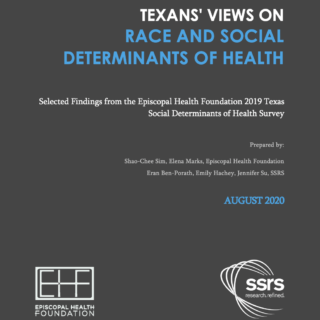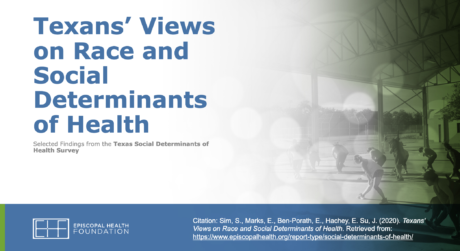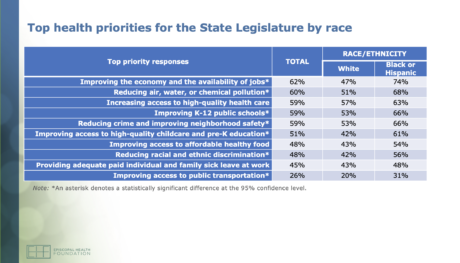Texas poll: Blacks and Hispanics in Texas more likely than Whites to say non-medical factors like quality of housing and education level are essential to their health
Survey finds Black and Hispanic Texans say people would be healthier if state government prioritized improving economy and schools, reducing pollution and crime
Blacks and Hispanics in Texas are more likely than Whites to say that non-medical factors such as where you live, your level of education, and your immigration status are critical to your overall health. Higher percentages of Blacks and Hispanics also say that state government should address economic and living conditions as public health priorities. Those are just some of the results of Episcopal Health Foundation’s first-of-its-kind statewide survey on social determinants of health and race in Texas.
EHF’s survey found that Texans across racial backgrounds agree that many non-medical factors like good air quality and clean water, community safety, and amount of stress are vital to a person’s health. But researchers discovered a larger racial divide when it comes to other social determinants of health. The poll finds that 79% of Black and Hispanic adults in Texas say that the quality of a person’s housing is essential or very important to their health, compared to 62% of White adults who say the same.
In addition, a significantly larger share of Black and Hispanic Texans (79%) think there’s a strong relationship between a person’s level of education and their health, compared to 55% of White Texans. Similar racial differences appear when it comes to a person’s immigration or legal residency status. Nearly two-thirds of Blacks and Hispanics (65%) say immigration status is a critical component to a person’s health, compared to less than half of Whites in Texas (43%).
The survey also found not only do more Blacks and Hispanics in Texas say they experienced racism compared to Whites, one in five Black and Hispanic Texans (20%) say that racial discrimination had a harmful effect on their health.
 “COVID-19 is just the latest example of why Blacks and Hispanics are more likely to appreciate the impact that underlying, non-medical conditions have on their health,” said Elena Marks, EHF’s president and CEO. “Coronavirus is shining a light on how social and economic conditions are conspiring against the health of Blacks and Hispanics in Texas. These groups are seeing more deaths and serious complications from the virus because they’re more likely to already suffer chronic conditions related to where they live that make them more susceptible.”
“COVID-19 is just the latest example of why Blacks and Hispanics are more likely to appreciate the impact that underlying, non-medical conditions have on their health,” said Elena Marks, EHF’s president and CEO. “Coronavirus is shining a light on how social and economic conditions are conspiring against the health of Blacks and Hispanics in Texas. These groups are seeing more deaths and serious complications from the virus because they’re more likely to already suffer chronic conditions related to where they live that make them more susceptible.”
Role of state government, health insurance in addressing non-medical factors
The survey also found that Blacks and Hispanics feel more strongly that state government should address many non-medical factors that impact Texans’ health. Almost three-quarters of Blacks and Hispanics (74%) say that improving the economy and availability of jobs should be a top health priority, compared with less than half of Whites (47%). Blacks and Hispanics are also significantly more likely than Whites to say improving public schools, decreasing pollution, lowering neighborhood crime, and reducing racial discrimination should be top public health priorities.
The survey also found that seven in 10 Blacks (73%) and Hispanics (71%) say that people would be healthier if the state spent more money on these non-medical factors, compared to 61% of Whites. Blacks (61%) and Hispanics (59%) were also more likely than Whites (39%) to say that the legislature should use a portion of the money the state already spends on health care to address non-medical factors.
“Texans are telling us what they want and need, and it goes beyond just being able to see a doctor or go to a hospital,” Marks said. “It’s about finally addressing all those things outside the doctor’s office that impact their health. If we really want to improve the health of Texans, then we should listen to them.”
In addition to increased state spending on social determinants of health, seven in 10 Black (73%) and Hispanic (70%) Texans think health insurance companies should help cover non-medical factors that affect health, compared to less than half (46%) of White Texans. In contrast, Whites (51%) say insurance companies should not provide coverage for social factors, nearly twice as many as Blacks (27%) or Hispanics (28%).
This report was released as EHF continues to celebrate five years of actively working to improve health, not just health care in Texas. These findings are the third in a series of reports drawing on EHF’s survey of Texans’ views of social determinants of health. The first report showed that a majority of Texans say that good medical care alone isn’t enough for them to live healthy lives. EHF’s second report looked at how Texans say state government, health insurance plans, and other parts of the health system should address non-medical factors that impact health in Texas.
Methodology
SSRS, an independent research company from Glen Mills, PA, conducted the Texans’ Views on Social Determinants of Health Survey on behalf of Episcopal Health Foundation by telephone from October 10 – November 19, 2019 among a random representative sample of 1,200 adults age 18 and older living in the state of Texas. Sampling, data collection, weighting and tabulation were managed by SSRS in close collaboration with Episcopal Health Foundation researchers.
The margin of sampling error for this study is plus or minus 4 percentage points for results based on the total sample. For results based on subgroups, the margin of sampling error may be higher.


